The League of American Bicyclists announced today that the highest level of achievement in their Bike Friendly Communities program is no longer Platinum:
To guide and support the rapid progress in top bike-friendly cities, the League of American Bicyclists has added a new challenge and opportunity for Bicycle Friendly Communities: Diamond status.
As many of you know, Portland leaders spent over two years on a coordinated effort to attain Platinum status. That effort began in 2006 and ended in triumph when the League deemed Portland the first-ever major city to win the award.
But with such a push for Platinum, many local advocates have grumbled that once achieved, it made Portland even more complacent and pleased with our own progress. Here’s how the Bicycle Transportation Alliance says it in a blog post about the new Diamond status:
“the Bicycle Transportation Alliance, along with many others, has often wished that the bar was higher. Too often we feel that city and region have been resting on their laurels. We also heard from opponents of investing in bike infrastructure that we have over-invested, or, “We are already Platinum, why do more?”.
BTA leader Rob Sadowsky is a member of the League’s Bicycle Friendly America National Advisory Group and he has been pushing internally for the higher standards.
So, what exactly with it take to reach the Diamond designation? I’m still working to find specifics; but here’s what the League is saying:
Attaining Diamond designation will involve an individualized challenge tailored to each community. The League will conduct a detailed audit for each city and work with community leaders to create clear 5-, 10- and 15-year goals for important factors like bicycle mode share, land use, crashes, network connectivity and bike culture.
The primary measure to Diamond designation: The number of people riding and citizen satisfaction. Cities will delve into a more detail evaluation of ridership and level of service, using standard methods of measure like the American Community Survey and National Bicycle and Pedestrian Documentation Project, but also more challenging and broader tools such as Copenhagen’s Bicycle Account.
Portland Bureau of Transportation Director Tom Miller was featured in the League’s official press release on the announcement, saying that Diamond is, “something Portland will actively pursue and ultimately achieve.”
For his part, Sadowsky has already put out what he thinks it will take for Portland to get the Diamond ring: “We need more recreational trails, both paved and mountain biking. And we need to get our crashes down.”
Stay tuned.



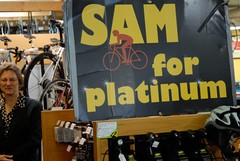
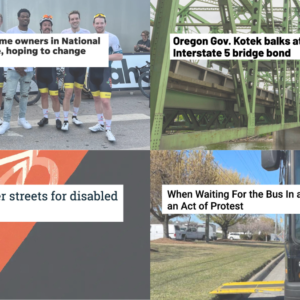
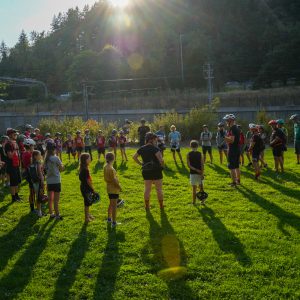
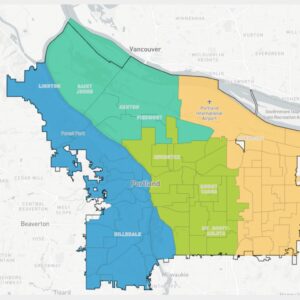
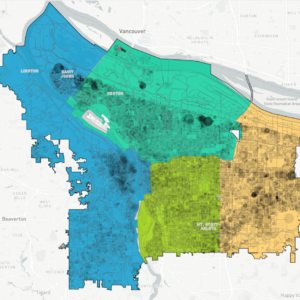
Thanks for reading.
BikePortland has served this community with independent community journalism since 2005. We rely on subscriptions from readers like you to survive. Your financial support is vital in keeping this valuable resource alive and well.
Please subscribe today to strengthen and expand our work.
I hope the award is something that you have to earn every year: dedicated public funds, miles of new cycling infrastructure, no bike license requirements, no helmet laws for adults, etc.
And, oh, some dirt to ride for all ages and skill levels. Perhaps not located next to freeways.
Amen, with the new stipulation that cities provide decent off-road trails to ride we are in major trouble! Might that be enough to jolt the parks department out of their anti-mountain bike rut?
At every level, there should be a strong emphasis on “what have you done lately?” Communities should have to demonstrate significant year-to-year progress in order to keep or improve their ratings.
This amp only goes to a ’10.’ This other amp is better because it has an ’11.’ Can we please just update the standards instead of picking new colors? Credit card companies have made the color grades a tired joke. Before ‘Platinum’ was great, now ‘diamond’ is the new hotness. Even though diamonds are controlled by a monopoly intent on hoarding and controlling supply, shutting down alternatives, and spending vast amounts of money on marketing to maintain high profit. They’re even made from fossil fuels!
Right on. And blood. Don’t forget the blood. No matter though, since the Ruskies have finally come clean after 40 years of cloak and dagger, diamonds are over.
Oh, and you might check your chemistry on that whole fossil fuels thing. Other than that, right on.
we don’t need to set the bar higher, we need to make the qualifications to get to that bar much higher…
give awards all you want, the state of cycling here is still dismal even though it’s the best in the country…
we shouldn’t win just because we’re the best around, we should win because we succeed…
stop grading us on a curve unless you’re going to include the entire world in your selection process…
I’m with Spiffy and Alan 1.0 here. All these rare earth metals give the wrong impression. We should be striving for what is already commonplace in some cities and countries. Emulating well-conceived multi-modal infrastructure that is the standard in other parts of the world is, to me, not well captured by borrowing a ranking order based on expensive jewelry.
If I were naming the levels of achievement I’d pick something like
Macadam
Brick
Rubber
Thermo-Paint
and link them to mode share: 5%; 10%; 15%; 20%, leaving enough higher status materials for where we hope to end up someday. Overtaking platinum at, what, 7% mode share seems like grade inflation to me.
This is the “cycling moonshot” I have been talking about. Imagine a city with true active transportation parity, where you can easily drive a car but wouldn’t want to mess with it. We need leadership to sell the idea of a city that works for everyone, including freight and auto interests.
This reminds me of the Diamonds/Water Paradox of economics. Nothing (necessarily) wrong with the flashy beauty of the latest infrastructure designs to accommodate bikes, but the real accomplishment is when the populace at large thinks of bikes in about the same way they think of water from the tap. Here’s to Water Status biking!
wow. I think this is good news. I mean I’m pretty damn sure that it is though of course I need to do a little research and find out more.
Now what I want to know is, once a few more details emerge, which of our two candidates for mayor are going to pledge to actively pursue this?
I am still on the fence as to who to vote for and a pledge to acheive Diamond Status, which comes with clear goals and plans, might swing that vote for me.
This is a great development. Portland clearly is a leader in the U.S., but there is a lot of merit to the complaint that the majority of what we have done until recently is to paint another stripe on the road. I can’t get on board with giving anyone an A+ until there is an extensive infrastructure that separates bicycle and car traffic. I agree with a lot of the vehicular cycling concepts but that doesn’t work for the “reluctant but curious” group. Props to Rob Sadowsky for pushing for a higher standard.
This is great, and props to Sadowsky for pushing to set the bar higher, especially reducing crashes.
HOWEVER, “more recreational trails, both paved and mountain biking” seems like a pretty weak goal to me. Why not push for buffered and protected bike lanes, which actually gets you places, unlike trails built for recreation? After all, it’s the Bicycle TRANSPORTATION Alliance, not the Bicycle Recreation Alliance.
Because the more people who ride for recreation, the more people we will have riding for transportation. I am happy that the BTA understands that relationship, which is why I joined for the first time this year. I (and most of my riding buddies) would never have bought a road bike for transportation without beginning my cyclist life as a BMXer–>mtb’er. Also, most kids I know ride for recreation, and they need places to be healthy, fun loving kids without breaking the law.
I hope that the LAB places more emphasis on off-road cycling. I am surprised that Portland received Platinum status given the dismal mountain bike situation here. It may force our elected leaders to wake up and see the many benefits of a strong mountain bike network.
So, would it be fair to say that the closure of the Broadway / Wheeler turn off from Broadway is a good first step to reducing crashes?? Have there been any incidents since that closure??
I’m loving this quote from the press release:
“If it sounds like we are moving the goalposts, it’s because we are,” says Andy Clarke, League President.
Raise the bar! A lot of people in both Portland and our arch-rival Minneapolis have gotten smug over how “bike-friendly” their cities are, when in reality we are not even in the same league with places like Copenhagen or Amsterdam. We’re only bike-friendly in relation to the rest of the US, and I’m glad we’re setting a new standard to aim for.
Minneapolis doesn’t have enough bike lanes and isn’t as nice for commuting as Portland, and Portland lacks the recreational opportunities -(BOTH mountain biking, AND extensive MUP systems) and suburban connectivity of the Twin Cities.
I hope they set the bar high enough that if you combine the best of both metro areas, you MIGHT have a shot at just barely qualifying for Diamond status.
I’m curious if there will be any similar changes to the related Bike Friendly Business and Bike Friendly University awards. I’m also curious what hovers above Diamond, if Portland meets this goal. Unobtanium?
Diamonds are made of carbon, ya know. Dirty, dirty carbon.
Yes, this has been needed for a while.
Davis, CA achieved Platinum with only a few changes to its existing bike programs, and it hasn’t much sense of “competition” to improve its facilities.
Once Portland reached Platinum, it seems to have lost a certain amount of impetus to make grand improvements.
A “Double Platinum” type rating has been needed ever since they set up the system, now we have it.
Davis, Portland, Boulder, let’s see some serious effort to turn ourselves into more serious bicycle cities. I mean, Portland and Davis are fine and all, but bicycling kinda sucks in a lot of ways here. And while ordinary Americans are happy to ride a bike in D, P and B, there’s still an insane number of people driving cars. And that *can* change, but it will take another level of effort.
Ted Buehler
The lack of standards, lack of evaluation, lack of comparison, lack of competition contributed to the demise of Davis as a European-level bicycle city. In 1980, they had 28% of commuter trips by bicycle. The city was the clear leader in bicycle mode share in the US, probably 5x what any other city had.
Mode share dropped in half to 14% in 2000.
But there was no data taken by the city, and with no numbers and no competition there was no way for anyone concerned about this to bring it into the light and address the problems.
Because of the lack of a “diamond” status (or any other status, I suspect), lack of measurements, lack of reporting, etc., Davis was lost as a shining star of bicycle-topianism in the US, and the whole country has suffered as a result.
With an active comparison, other major bicycle cities of the 70s might also have fared better, like Eugene, Santa Barbara, Palo Alto, Missoula. All were leaders in the 70s, and of them Palo Alto is the only real leader now (but it also lapsed in the 80s and 90s).
Thanks, LAB, for setting the bar higher for us all.
Ted Buehler
But every city you are mentioning has a large percentage of it’s population that are college students. This is always going to skew the results toward more kids biking to school.
Though that in no way explains the major drop you noted in Davis.
“This is always going to skew the results toward more kids biking to school.”
But what is our excuse?
PCC, PSU, OHSU, Lewis & Clark, UP, Reed, etc.
No one would label Portland a College Town, but still.
I was simply thinking that it’s unrealistic to compare Portland to the other mentioned cities. There would have to be a cataclysmic shift to see us jump to 28% mode share cycling any time soon.
“There would have to be a cataclysmic shift to see us jump to 28% mode share cycling any time soon.”
Those do happen sometimes.
si cʾest possible, cʾest fait; impossible? cela se fera
Sigh. This ginning up new levels all the time is vulgar and simple-minded to boot. They should have named the new level Unobtanium and been done with it.
i have never understood how any city in oregon can have platinum or whatever status while the state still has far to right and mandatory sidepath laws
Once the mandatory licensing law passes, we’ll be lucky to have any rating at all.
“Wow!!! Gold Plated Latinum status will be a game changer!!! We must commit serious dollars to this right now to get it before Abilene, TX does!!!”.
Yawn. A bunch of wonks getting excited about winning an award given by other wonks that is only coveted and understand by that community of wonks. Kind of like the Oscars but without glamour and with more bearded nerds wearing flourescent jackets.
Five or ten years from now, bicyclists will still be second class citizens in Portland and still susceptible to death via moving metal boxes. But those boxes will get 50 mpg and have longer battery ranges so, hurray for the environment! With 10% mode share, we’ll get to read about more of these on BikePortland because that’s still not enough votes to convince a politician that he or she can upset the current transportation paradigm and still survive the next election cycle.
Single Occupancy Vehicles still rule the roads in Portland. Until public transportation in Portland is more bike-friendly, and more widely used by all socio-economic levels, we will continue on the current path of complacency. The need and desire for more off-road paths and trails has been made loud and clear by many Portlanders. Let them eat the cake!